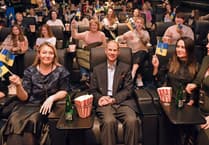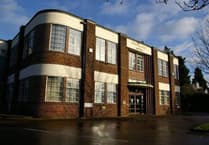You could say this stunning Alton Fringe Theatre of Breaking the Code was the cultural alternative to the impending pantomime season: the town’s Oppenheimer to its Barbie if you will.
No dames, silly characters or double entendres in sight, just a magnificent and thought-provoking production about one of the most intriguing and important figures of the 20th century.
The AFT’s take on the Hugh Whitemore tale focuses on Alan Turing, the mathematician, cryptographer and computer scientist best known for breaking the Enigma code during WWII at Bletchley Park.
But there’s also the breaking of a moral code, given he was criminalised at the time for being a homosexual man.
From the off the audience was riveted, both by complex mathematical and philosophical ideas one minute, before being moved to tears by the need for love and understanding.
This was down to the intelligent, sensitive direction of Steve Gerlach and the conviction and brilliance of the whole cast and creative team.
Julian Chou-Lambert’s powerfully evocative soundscape, with its repetitive and mechanical sounds mirroring the machines and Turing’s mind, hooked the audience from the start and added emotional depth.
Chris Lane perfectly captured Turing’s arrogance and vulnerability, his self-belief and naivety. The stammering was well-judged, indicating his state of mind.
The direction of the play also brought the love story between Alan and school friend Christopher Morcom, played with a natural ease by Matthew Twaite, to the fore with subtle indications like a scarf being draped over a shoulder.
.jpg?width=752&height=500&crop=752:500)
The play is structured around a series of interviews between Det. Sergeant Ross and Turing with Simon Applegarth being totally convincing as the former.
Jane Samways’ exquisite performance as Turing’s mother has emotional depth and range which moved the audience to tears on both evenings, especially the final scene in the police station with its shattering dignity.
The other female character, Pat Green, was played by Lisa Felix in a convincing and unassuming way, with youthful enthusiasm being displayed on meeting the ‘hero’ Turing.
Contrasting with Ross’s world-weary police officer is MI5’s John Smith, urbanely portrayed by Sarah Castle-Smith and embodying the establishment.
Turing’s sexuality takes him to the fringes of society where he encounters ‘bit of rough’ Ron Miller with Joe de Peyrecave-Moore bringing out the complexity of this character with skill and great emotional depth with an undercurrent of suppressed violence.
The flashbacks were vividly brought to life in the character of the head of operations, Dilly Knox, played by Rod Sharp, who gives a consummate performance of this eccentric individual.
Mention must be given to the informative, interesting programme providing context and insight into the production. The cover design with a fine pen portrait of Turing by Helen de Peyrecave is arresting.
Efficient scene changes, costume and lighting effects aided the actors’ pacy clear storytelling.
Knox’s parting words of warning to Turing stayed with me as a challenge for our time. He is quoting Wittgenstein: “We feel that even when all possible scientific questions have been answered, the problems of life remain completely unanswered.”
The question how to live, be a human being in an age increasingly dominated by technology, is one we face now.
Perhaps a start is to continue supporting live arts events which offer a collective experience in real time and space bringing us together in our shared humanity.
By Jo Hopkins
.jpeg?width=752&height=500&crop=752:500)





